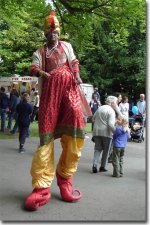ancient_mariner
Moderator
- Messages
- 23,580
- Name
- Toni
- Edit My Images
- No
My eyes are changing, and not for the better.
Having once had very sharp eyes, now one eye is short sighted, the other long and also affected by astigmatism. This results in vision that is functional but not pin-sharp, particularly now at the sides, leaving reality much softer and less detailed than it once was. I don't *need* glasses to live normally, and for the periods when I've worn them, reality has looked quite harsh and contrasty.
Over the years my requirement of how an image should look has changed too. As a film camera user, 35mm never gave enough detail, and medium format was 'adequate' only. I mention this because when I say that after starting with decent digital (i.e. not a compact) in 2013, my attention was directed at getting decent levels of detail from an image - it's easy to assume this was just rookie behaviour trying to push all sliders to the right, and while there may have been something to that, it just ignorance.
See where I'm going?
Over the last 3 years or so I have found increasingly that I prefer pictures with the clarity rolled off considerably, still highly detailed when I zoom in, but softer, smoother, sometimes with slightly odd behaviour in highlghts and shadows. I think this is because it matches more what I see with my own eyes, even when I process for mono.
Roger @droj kindly commented last week about the way I'd processed an image, and this got me thinking about why I did it that way, and why I do sometimes push the sliders for results that aren't natural or don't fit with how others see things. @Lez325 also commented that I do quite a bit of abstract landscape, and again, that's partly because of how the world appears these days.
This isn't intended as a 'get out of jail free' card for slider abuse, but I do wonder if a part of what drives our approach to processing (or not) is because of how the world looks through our own eyes, let alone a viewfinder or computer screen.
Having once had very sharp eyes, now one eye is short sighted, the other long and also affected by astigmatism. This results in vision that is functional but not pin-sharp, particularly now at the sides, leaving reality much softer and less detailed than it once was. I don't *need* glasses to live normally, and for the periods when I've worn them, reality has looked quite harsh and contrasty.
Over the years my requirement of how an image should look has changed too. As a film camera user, 35mm never gave enough detail, and medium format was 'adequate' only. I mention this because when I say that after starting with decent digital (i.e. not a compact) in 2013, my attention was directed at getting decent levels of detail from an image - it's easy to assume this was just rookie behaviour trying to push all sliders to the right, and while there may have been something to that, it just ignorance.
See where I'm going?
Over the last 3 years or so I have found increasingly that I prefer pictures with the clarity rolled off considerably, still highly detailed when I zoom in, but softer, smoother, sometimes with slightly odd behaviour in highlghts and shadows. I think this is because it matches more what I see with my own eyes, even when I process for mono.
Roger @droj kindly commented last week about the way I'd processed an image, and this got me thinking about why I did it that way, and why I do sometimes push the sliders for results that aren't natural or don't fit with how others see things. @Lez325 also commented that I do quite a bit of abstract landscape, and again, that's partly because of how the world appears these days.
This isn't intended as a 'get out of jail free' card for slider abuse, but I do wonder if a part of what drives our approach to processing (or not) is because of how the world looks through our own eyes, let alone a viewfinder or computer screen.
Last edited:



